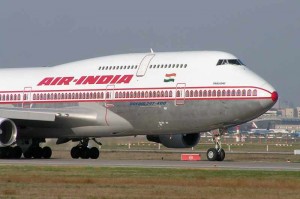 Most commercial planes from India continue to fly over conflict zones, including the Af-Pak region, even as experts raised serious security concerns over the practice after pro-Russian rebels in Ukraine shot down a Malaysian plane on Thursday. In fact, most flights going from India to Europe and North America, and coming back, fly over conflict zones in Pakistan and Afghanistan. Militants also attacked the Kabul airport on Thursday, forcing Indian carrier Spice Jet to temporarily suspend its flights to the Afghanistan’s capital. “We have been flying over Kabul as the threat perception is not so bad. This is because of the presence of American security forces in the country,” claimed a senior Air India official reported Sunday Guardian.
Most commercial planes from India continue to fly over conflict zones, including the Af-Pak region, even as experts raised serious security concerns over the practice after pro-Russian rebels in Ukraine shot down a Malaysian plane on Thursday. In fact, most flights going from India to Europe and North America, and coming back, fly over conflict zones in Pakistan and Afghanistan. Militants also attacked the Kabul airport on Thursday, forcing Indian carrier Spice Jet to temporarily suspend its flights to the Afghanistan’s capital. “We have been flying over Kabul as the threat perception is not so bad. This is because of the presence of American security forces in the country,” claimed a senior Air India official reported Sunday Guardian.
298 passengers are feared dead in the Malaysian plane crash. American President Barack Obama has squarely blamed Russia for the attack. The US intelligence believes that it was a missile strike that brought the plane down. The Malaysian flight MH17 was a 777-200 travelling at an altitude of 10 km.
Although Air India has issued orders asking airlines to avoid flying over Ukraine, the senior official said that the national carrier and other commercial flights continued to fly over the country. “Planes are avoiding the corridor in which the Malaysian plane was shot down. But they are flying north and south of it (inside Ukraine),” he said.
Indian planes have been avoiding certain parts of the airspace in other conflict zones like Iraq, Syria and Palestine, he said.
The website flightradar24.com showed that flights continued to go over Afghanistan and Ukraine. The website also showed that an Air India plane and a Singapore Airlines plane were within 15 miles of the Malaysian plane that was shot down, a distance that could have been covered in five minutes.
Aviation experts said that 300-odd flights go over the Ukrainian airspace daily. “The downing of the Malaysian plane adds a new security dimension. It’s the second biggest security challenge since 9/11,” said Kapil Kaul, an aviation expert.
Kaul said that the Ukraine incident “could accelerate such actions in the Af-Pak region”. “One option is to declare such regions as no-fly zones, but this can only be done after a global, independent and thorough probe about what caused the incident in Ukraine and the security challenges in regions like Af-Pak.”
Amber Dubey, head of aviation at KPMG, a consultancy firm, said that it was earlier presumed that only defence forces had the capability to pull off such attacks but the Ukraine incident had shown that “any trigger-happy idiot with access to a button can do this again. The Af-Pak region is at risk too.”
Dubey said that flights from northern and western Europe bound for the Middle East preferred to fly via Ukraine as it made “travelling in a straight line” possible. “If you have to circle around, the cost will go up,” he said.
However, he added that while “in Ukraine, there are two countries at war, in Afghanistan, the Taliban may not have the same capability”.
Ankur Bhatia, CEO of Bird group, an aviation consultancy firm, said that “There are multiple conflict zones. Unfortunately, airlines cannot stop flying.”
He added that it is for international aviation organisations and governments to decide “how critical the situation is”.